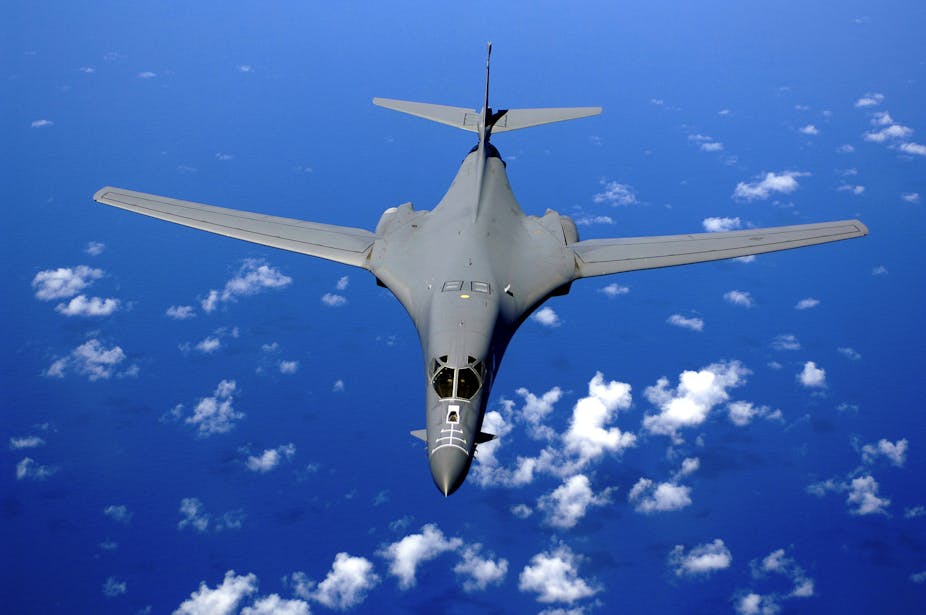One of the least surprising bits of news this week was the revelation that the United States will be “rotating” B-1 bombers through Australia after all. For anyone who has taken even the most cursory interest in the history of the alliance between Australia and the US, the only novelty was the way we found out about it.
When US Defence Department Assistant Secretary for Asian and Pacific Security Affairs David Shear suggested that the US planned to place B-1 bombers in Australia as part of its general “rebalance” to the Asia Pacific he thoroughly embarrassed his potential hosts.
Both US and Australian officials were quick to claim that Shear “mis-spoke” and there were no such plans. But it was difficult to imagine that such a senior figure didn’t really know what he was talking about. As we now know, though, he did.
It is testimony to how little Australian perspectives and interests actually impinge on the American consciousness, however, that so little thought was given to how this might play out here.
It’s worth asking why the Abbott government would be so apparently mortified by this turn of events. After all, Tony Abbott has been at pains to assure Barack Obama that Australia is an “utterly dependable ally”. Given the prominent role successive Australian governments have played in supporting the US in one conflict or another, the American president probably needed little convincing of this.
Yet for all Australia’s unquestioning loyalty, Shear’s actions remind us that even amongst the closest of friends, national interests prevail and domestic audiences are paramount. Shear might be forgiven for forgetting that it’s good form to let the junior alliance partner announce a change in its strategic status. When seen from inside the Beltway, however, it is only Washington’s view of the world that counts.
That Australia should be regarded as a useful, rather taken-for-granted partner should not surprise us. International relations was ever thus: subordinate allies are necessarily less influential than their ostensible guardians. What is more surprising, perhaps, is that so much effort is normally given to talking up the degree to which Australia’s views are taken into account.
Yet mis-speaking is also the order of the day when it comes to describing the status of American personnel and assets on Australian soil. For alliance supporters, such as The Australian’s Greg Sheridan, the endlessly repeated mantra is that the US does not have bases in Australia; its troops and hardware are simply passing through or “rotating”, to use the preferred euphemism. Whether such semantic niceties cut much ice in Beijing is a moot point.
Influence and a privileged access to intelligence are often portrayed as prized benefits of the relationship which other less-favoured and fortunate states regard with envy. They also justify getting the Chinese offside. Perhaps so, although it is necessarily difficult to gauge the value of intelligence that is by definition restricted and secret. What we can say is that participation in intelligence-gathering activities can be embarrassing when discovered, as the recent contretemps with Indonesia reminds us.
It is also clear that the costs of the alliance for Australia have been considerable, not least in human lives. In addition, however, there is the ever-escalating financial cost of “doing our bit” and actually demonstrating our dependability as an ally. In addition to new fleets of submarines and surface ships, Australia is about to buy over 70 F35 Joint Strike Fighters from the US for upwards – probably a long way upward – of $25 billion.
It is difficult to imagine the precise circumstances in which all this new hardware – assuming it actually works – will ever be employed. It is especially hard to see it being used in the actual defence of Australia: as everyone agrees, this is the remotest of possibilities. It may be used in some far-flung part of the world in support of some American war or other, but is that quite how we want to spend scarce taxpayer dollars in these fiscally challenged times?
It is now widely recognised that a close strategic relationship with the US makes relations with China problematic. China, as everyone knows, is still our most important trade partner, the calamitous and entirely predictable decline in resource prices notwithstanding. China’s economic importance may not be sufficient reason to abandon close strategic ties with the US, but it does – or ought to – give pause for thought about the possible collateral damage inflicted by the alliance.
The big question for the US and its utterly dependable allies is what they would do if the US and China came to blows over the latter’s expansionary territorial ambitions in the South China Sea. This is no longer an inconceivable prospect, despite the fact that neither side wants or could benefit from such a conflict. Yet given the amount of political and strategic capital the US is investing in the region in an effort to dispel doubts about its possible decline and willingness to defend its allies, it is difficult to see how it can gracefully withdraw from an increasingly fraught standoff.
In such a scenario, Australia would almost certainly feel compelled to support the US as it always has, despite the fact that such a conflict looks unwinnable in any meaningful sense. It hardly needs to be added that it wouldn’t do much for Sino-Australian ties either. Let’s hope the US at least tells Australia what our duty is before things turn ugly – even if our collective response is all too predictable.
An earlier version of this article was published on Australian Outlook.

